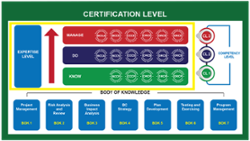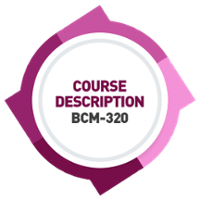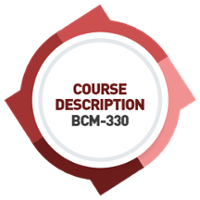 Profile of Organisation BCM Coordinator (OBC)
Profile of Organisation BCM Coordinator (OBC)
The OBC is primarily a Subject-Matter Expert in the organisation’s BC program.
OBC is primarily a Subject-Matter Expert in the organisation’s BC program.
This person is appointed to manage the implementation of the BCM plan for the organisation, oversee the management of the program, and maintain the plan upon its implementation.
Typically, in a full-time position in medium—to large organisations, the OBC manages and continually improves the organisation’s BCM program.
It is vital that the OBC has a detailed knowledge of the organization’s operations and critical business functions and is equipped with in-depth BCM knowledge so that he/she can conduct a detailed and thorough review of all BC Plans and formulate organization-specific tests and exercises.
Roles and Responsibilities of Organisation BCM Coordinator (OBC)
The full range of roles and responsibilities for the Organisation BCM Coordinator (OBC) are appended:
- Has detailed knowledge of the organisation’s operations and critical product services and functions;
- Integrate the organisation’s BCM concerns with its business processes;
- Implement and manage BCM Plans across all departments and the organization;
- Review and conduct tests and exercises involving all business units in the organisation;
- Conduct briefings, training, or workshops for staff members; and
- Update management regularly on the integrity of existing BCM plans.
Detailed Roles and Responsibilities
A good BCM program should be well integrated into an organization's daily processes and updated in tandem with changes in business operations. Therefore, the OBC should be fairly experienced in the organization and very aware of the organization's concerns about its operations.
In addition to the specified roles mentioned, the Organisation BCM Coordinator is expected to manage the BCM program specifically in the areas appended.
Critical Products, Services, and Business Functions
The OBC should be able to identify the critical business functions in the organization.
The OBC is responsible for ensuring that the organisation's BC Plans contain adequate procedures to confirm that critical business functions can continue functioning within their Recovery Time Objectives (RTOs), which were discussed and agreed upon with the relevant BU BCM Coordinators to prevent significant damage to the organisation.
Update, Maintenance, and Continuous Improvement
The OBC monitors and reviews BC Plans across all BU within the organization. This activity focuses on ensuring consistency in procedures that align with the organization’s BC Policy. While the BU BCM Coordinator may manage each BU BCM Plan, the OBC should be aware of and scrutinize the procedures to ensure adequacy.
Where possible, the OBC should liaise with the BU BCM Coordinator and streamline BC procedures to minimise costs, increase efficiency, lower impacts and likelihoods, and, where possible, avoid the risk of a threat altogether. Any findings should then be submitted to management for approval and subsequent implementation.
Induction of New Staff Member
The organization's BCM Coordinator should also be informed of incoming new staff, as they will need to be briefed on the organization’s BC Policy.
Where required, appointment changes (e.g. BU BCM Coordinator) may require the Organisation BCM Coordinator to conduct workshops and training for these new appointees.
Awareness Briefing
During unique situations (e.g., the possible threat of pandemic), the Organisation's BCM Coordinator should conduct awareness briefings for staff. These briefings remind them of existing organization protocols to safeguard their interests and clarify any concerns that may be raised.
Exercising and Testing
The OBC should manage the organization’s exercise and testing calendar. While the BU BCM Coordinator may conduct BU-level BC activities, the consolidation and tabulation of data for a report to executive management fall under the purview of the OBCr.
It is recommended that the OBC be informed of BU-level BC activities to ensure that the planned activities are suitable and sufficiently test the robustness of BU Plans.
Recommendations for Organisation BCM Coordinators
 Thus, the OBC needs to know all three levels of competencies, which are "Know-Do-Manage." With this in mind, the OBC can choose several training routes depending on his/her schedule and certification needs.
Thus, the OBC needs to know all three levels of competencies, which are "Know-Do-Manage." With this in mind, the OBC can choose several training routes depending on his/her schedule and certification needs.
 They should attend the certification programs held over a continuous period, for example, four days. These programs will cover all essential skills and BC tools needed to perform one’s role.
They should attend the certification programs held over a continuous period, for example, four days. These programs will cover all essential skills and BC tools needed to perform one’s role.
While competency-based courses are mainly short, this does not imply that BC personnel should skip certification programs altogether. Certification programs offer comprehensive coverage of BCM practices and will be able to patch any possible gaps in knowledge for experienced OBCs. Certification training programs also provide the advantage of granting the holder an internationally recognized credential in the relevant areas of BCM.
These recommendations are to assist training managers in mapping the OBC training program; a brief three-year training roadmap is appended below.
BCM Certification and Competency-based Courses for Organisation BCM Coordinators

Certification Courses
Before he can embark on his role, the organisation's BCM Coordinator must have sufficient BC knowledge covering a broad range of competencies on various aspects of BCM planning. Therefore, it is recommended that he attend the Expert Implementer certification program.
 This comprehensive BCM course is suitable for newly appointed OBCs and experienced coordinators. It enables participants to understand the 7 BCM BoK needed for implementing and maintaining BCM programs.
This comprehensive BCM course is suitable for newly appointed OBCs and experienced coordinators. It enables participants to understand the 7 BCM BoK needed for implementing and maintaining BCM programs.
The advanced level ISO22301 BCMS Expert Implementer course would take the participant from understanding the basics of BCM to the steps and documentation needed to implement, manage, and maintain the program.
This certification program would allow participants to get insights into market best practices that are shared by course facilitators who are industry practitioners.
Public-run courses would also enable participants to gain insights and alternatives from other participants on implementing and managing a BCM plan by different industries and company sizes.
Participants who complete the courses pass the Qualifying Business Continuity Certified Expert (BCCE) examination and meet the prerequisites. They will also be certified by the globally recognized BCCE certificate.
Organisation BCM Coordinators can complete the ISO22301 BCMS Expert Implementer via two instalments, and they are:
|
ISO 22301 BCMS Implementer |
ISO 22301 BCMS Manager |
ISO 22301 BCMS Expert Implementer |
|
| BCM-300 | BCM-400 | BCM-5000 | |
 |
 |
= |  |
Competency-based Courses
Organisation BCM Coordinators who are progressively upgrading themselves or cannot afford to take four consecutive training days can opt to attend specialised competency-based courses.
| Assessing BC Requirements | Developing BC Strategies and Plans | Testing and Exercising Business Continuity Plans |
| Course Code: WSQ-BCM-310 | Course Code: WSQ-BCM-320 | Course Code: WSQ- BCM-330 |
 |
 |
 |
- Assessing BC Requirements (Course Code: BCM-310)
- Developing BC Strategies and Plans (Course Code: BCM-320)
- Testing and Exercising Business Continuity Plans (Course Code: BCM-330)
It is recommended that OBCs proceed to complete the BCCE certification via the ISO 22301 BCMS Manager course (Course Code: BCM-400). Currently, no appropriate competency-based BCM courses are equivalent to the ISO22301 BCMS Manager course content.
These courses are particular to the various stages of implementing a BC plan. They are suitable for the OBC, who needs a quick and fundamental understanding of these phases. Newly appointed OBCs should attend the courses.

Certification Courses
For the following year, as OBCs are familiar with their plan, they should be trained to audit their plans.
with their plan, they should be trained to audit their plans.
The 4.5-day ISO 22301 BCMS Lead Auditor course is the best training for these Organisation BCM Coordinators. The course covers the fundamentals of BCM before going in-depth to learn more about the needs of the ISO 22301 standard and how to conduct an audit.
This course also serves as an excellent platform to understand how external auditors conduct audits on their client company’s BC plan. Upon course completion, participants may be awarded the globally recognised Business Continuity Certified Lead Auditor (BCCLA) certification.
Upon course completion, participants may be awarded the globally recognised Business Continuity Certified Lead Auditor (BCCLA) certification.
There is no competency-based course for ISO 22301 BCMS Lead Auditor.
Recommended Training Schedule
The recommended training schedule allows participants to go on a step-by-step journey through the process of starting a BCM plan.
It would enable them to understand how to obtain buy-in from management during the different stages of implementation and familiarize themselves with the various templates of a BCM Plan.
Experienced organization BCM coordinators may opt to attend any courses separately depending on their BCM knowledge needs.
Certification Courses

As OBCs have gotten themselves well
equipped with the various aspects of their BCM management skills, we recommend they further their competency by training in Crisis Management (CM) and Crisis Communication (CC).
While BC focuses on business continuity, specifically its critical process operations, in times of disaster, crisis management deals with the overall coordination of an organization's response to a crisis in a practical, timely manner. Crisis management and Crisis Communication aim to avoid or minimize damage to the organization's profitability, reputation, or ability to operate.
 Crisis Management Expert Implementer course would introduce the participants to the fundamentals of crisis management, the necessary knowledge to develop a crisis management plan, the skills needed to manage a crisis management team, and the ways to maintain the plan.
Crisis Management Expert Implementer course would introduce the participants to the fundamentals of crisis management, the necessary knowledge to develop a crisis management plan, the skills needed to manage a crisis management team, and the ways to maintain the plan. The Crisis Communication Expert Implementer course will, in turn, focus on how crisis management or BCM experts manage crisis communication for an organization during a disaster or crisis.
The Crisis Communication Expert Implementer course will, in turn, focus on how crisis management or BCM experts manage crisis communication for an organization during a disaster or crisis.
These four-day or four-module courses with 3.5 hours of examinations each would allow participants to get the globally recognized Crisis Management Certified Expert (CMCE) or Crisis Communication Certified Expert (CCCE), depending on the course they took.
Competency-based Courses
For the third year, refresher courses that are unique to various stages of Crisis Management and Crisis Communication planning may be recommended:
| Implement a CM plan | Manage and Execute a CM plan | Implement a CC plan | Manage and Execute a CC plan |
|
WSQ-BCM-360 |
WSQ-BCM-460 |
WSQ-BCM-350 |
WSQ-BCM-450 |
 |
![[WSQ-CM-460] Course Overview: Executing And Managing Crisis Management Plan](https://no-cache.hubspot.com/cta/default/3893111/29629b5a-8134-4f00-8f82-0bff27e5076e.png) |
 |
 |
As OBCs are experienced, most would not want to attend competency-based training.
While the duration of these courses is longer as they require review and assessment of competency, they do allow industry practitioners who are subject matter experts to provide an avenue for discussions and questions and answers during the sessions. These sessions allow for interaction and sharing of best practices.
Year One (BCM)
 Detailed Year One Training: Recommended 3-year training roadmap of Certification and Competency-based courses for Organisation BCM Coordinator (OBC)
Detailed Year One Training: Recommended 3-year training roadmap of Certification and Competency-based courses for Organisation BCM Coordinator (OBC)
Year Two (CM)
 Detailed Year Two Training: Recommended 3-year training roadmap of Certification and Competency-based courses for OBC
Detailed Year Two Training: Recommended 3-year training roadmap of Certification and Competency-based courses for OBC
Year Three (CC-Audit-DR)
An organisation's BCM Coordinator can consider three related skill sets. The options include BCM audit, crisis communication, and IT disaster recovery.

 Detailed Year Three Training: Recommended 3-year training roadmap of Certification and Competency-based courses for OBC
Detailed Year Three Training: Recommended 3-year training roadmap of Certification and Competency-based courses for OBC

Reference
Goh, M. H. (2021). A Manager's Guide to Implement Your BCM Training and Learning Roadmap. Business Continuity Management Manager's Guide Series (3rd ed.). Singapore: GMH Pte Ltd.
Extracted from "Chapter 4: Organisation BCM Coordinator"
More Information About Business Continuity Management Courses
To know more about our blended learning program and when the next course is scheduled, contact our friendly course consultant colleagues via sales.ap@bcm-institute.org. They are the B-3 BCM-300 ISO22301 BCMS Implementer and the B-5 BCM-5000 ISO22301 BCMS Expert Implementer.
![FAQ [BL-B-3]](https://no-cache.hubspot.com/cta/default/3893111/b3824ba1-7aa1-4eb6-bef8-94f57121c5ae.png) |
Please feel free to send us a note if you have any of these questions to sales.ap@bcm-institute.org |
 |





















